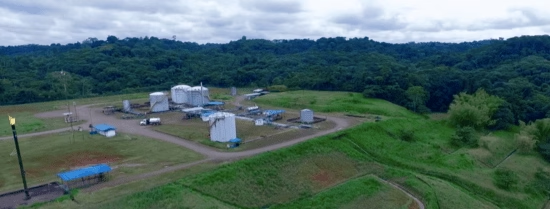The ‘All Eyes on the Amazon’ project, led by Greenpeace and Hivos, fights deforestation, the impacts of extractive industries and defends the rights of local communities. Lorenzo Pellegrini and Murat Arsel from the International Institute of Social Studies (ISS) led the knowledge component of the program in the Ecuadorian and Peruvian Amazon. Oil extraction in these areas has had devastating effects for decades. Arsel: “We want to do scientific work that is useful and make a small contribution to people’s struggles.”
(The All Eyes on the Amazon project ended in September 2022)
The Amazon is known and appreciated for its extremely rich biodiversity. Unfortunately, deforestation, for example because of mining and agriculture, is threatening the ecosystems and the life of local communities. Few people know that the oil industry is also a hazard. Pellegrini and Arsel have seen this with their own eyes in Ecuador, where they have been studying the impact of oil extractions since 2010. “We collaborate closely with local communities to document the effects of oil operations. It’s not hard to see the devastating effects on ecosystems and health”, says Pellegrini. “The local people know this from firsthand, better and long before we can observe it. But often they don’t manage to communicate it in an effective way outside their communities.”

Gathering evidence
To gather evidence, and communicate the impact of the oil extractions, is the essence of the ‘All eyes on the Amazon’ project. With the use of simple smartphones and consumer drones the project gathers evidence and footage. The researchers work together with many partners like The San Francisco University of Quito and NGO’s such as HIVOS and Greenpeace. The Dutch Postcode Lottery is one of the main funders.

This helped communities to get compensation from oil firms, to push for environmental remediation and on a larger scale to influence laws. “At the moment, the law dictates that oil companies must pay for community monitoring when they open new projects. This was a big success, but now the challenge is compliance with that law”, says Pellegrini. Above all, they want the local communities to benefit. “We want to do excellent scientific work that is useful. This way we can make a small contribution to people’s struggles”, explains Arsel. “I see myself as a scholar who is an activist. We don’t want to be a fly on the wall, but we really want to know what is happening on the ground. Otherwise, the science is not good enough for me.”
Documentary
That’s why Arsel and Pellegrini want to do more than deliver academic papers. They were involved in developing workshops about how to use drones and smartphones in a more effective way, and to inform local communities about their rights if they get stopped by the police or the security of oil companies. Also, they worked together with director Andrea Marinelli to make a documentary about the project. Pellegrini: “This helped us to reach a whole new audience and cross bridges. I’m very happy with the way it turned out. It’s artistically appealing and we tried to show the beauty of the area and the ugliness of the oil extractions at the same time.”

Maria’s paradox
The documentary was not made to be a piece of propaganda against all companies. The reality is much more complex, both researchers know. There is a lot of resistance against oil extraction, but to their own surprise some local people were still in favor of extracting more oil. Not that they don’t know the negative effects, but they feel it might bring jobs and stability. “We met Maria who became a symbol for this. In essence the Maria’s paradox means; You know it’s bad, but you still want it.”
Pellegrini even compares it to addiction. “It’s the same type of dependence. Oil extraction has been the main economic activity since the 70’s, so you can’t suddenly stop.” Also, the researchers see that oil extraction has been a big part of people’s lives for so long that they can’t imagine an alternative. They emphasize that the goal of their research is not to stop oil extraction. Arsel: “We find it important to think better about where and how to extract the oil and to guarantee reasonable compensation with the view of a general winding up of the whole fossil fuel industry. Also, we wanted to open space for an economy that is not based on oil. There are alternatives.”
- Professor
- Professor
- Related content
- Related links
- Detailed information on the 'All Eyes on the Amazon' research project

